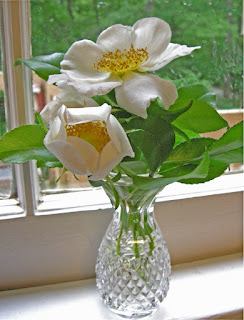Red-suited men sporting long white beards are everywhere:
in stores,
on TV,
at parties.
There is no one who doesnt recognize these fellows.
As a youngster, I was afraid of him. As I got older, I figured him out, but kept the information to myself. Later, when I had my own children, we gave them gifts from Santa Claus on Christmas morning, but never took them to visit him or sit in his lap.
Now I continue to believe in the gift of giving .
So, I embrace the symbol and prefer to be positive about *him*.
Any one who says *there's no such thing as Santa Claus* looses credibility.
Clearly, he exists.
One of my favorite poets explains ~
Nicholas, Bishop of Myra's See,
Was holy a saint
As a saint could be;
Saved not a bit
Of his worldly wealth
And loved to commit
Good deeds by stealth.
Was there a poor man,
Wanting a roof?
Nicholas sheltered him weatherproof.
Who lacked a morsel
Had but to ask it
And at his doorsill
Was Nicholas' basket.
0, many a basket did he carry.
Penniless girls
Whom none would marry
Used to discover to their delight,
Into their windows
Tossed at night
(When the moon was old
And the dark was showry),
Bags of gold
Enough for a dowry.
People, I read,
Grew slightly lyrical,
Calling each deed
He did, a miracle.
Told how he calmed the sea for sailors
And rescued children
From awful jailors
Who, drawing lots
For the foul design,
Liked pickling tots
In pickle brine.
Nicholas, circa
Fourth cent. A.D.,
Died in the odor of sanctity.
But fortune changes,
Blessings pass,
And look what's happened to Nicholas.
He who had feared
The world's applause,
Now, with a beard,
Is Santa Claus.
A multiplied elf, he struts and poses,
Ringing up sales
In putty noses;
With Comet and Cupid
His constant partners,
Telling tall tales to kindergart'ners,
His halo fickle as
Wind and wave.
While dizzily Nicholas
Spins in his grave.
"Origin of Species"
from TIMES THREE
by Phyllis McGinley


















